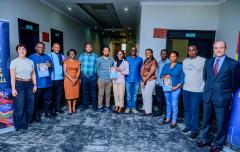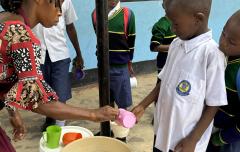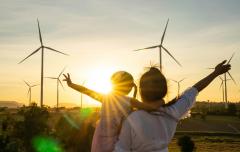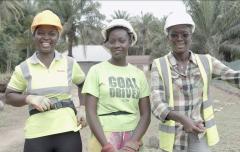Scotland hosts European launch of UN Decade of Sustainable Energy for All
Vienna/Glasgow, 24 July 2014: Scotland played host to the launch of a major UN initiative that aims to ensure sustainable energy for all by 2030.
Held to coincide with the start of the XX Commonwealth Games in Glasgow, the European launch of the Decade for Sustainable Energy for All (SEforALL) brought together representatives of government, businesses, academia and civil society from across the Commonwealth countries.
Keeping with the core values of the games – “Humanity, Equality and Destiny” the launch underscored the importance of energy access for economic development, peace and security for both the developed and developing world and the importance of achieving the initiative’s three inter-dependent and complementary goals of providing universal access to modern energy services, doubling the global rate of improvement in energy efficiency, and doubling the share of renewable energy in the global energy mix for our shared prosperity and destiny.
UN Under-Secretary-General, Kandeh K. Yumkella, the Secretary-General’s Special Representative for Sustainable Energy for All and the initiative’s chief executive, noted in his keynote remarks that energy issues are about equity and development for our shared humanity.
“In most Commonwealth countries, Africa and South-Asia in particular, energy is a woman’s issue. It can mean the difference between safety and fear, freedom and servitude, and even life and death. We have dedicated the first two years of the Decade to highlight the importance of energy for Women and Children’s Health and Economic Empowerment,” noted Yumkella. Calling on the world community to come together and end energy poverty and prevent the dangerous effect of climate change. In the spirit of the Commonwealth games, Yumkella further noted that “as sports unify nations, we are convinced that energy can also be the main engine for regional integration, peace and security,” said Yumkella.
Recognizing Scotland as a world leader in renewable energy and climate change policy, Climate Change Minister Paul Wheelhouse said: “Scotland has a high ambition and a progressive approach to the international challenge of climate change and we are delivering results – for example cutting emissions by 30 per cent since 1990; increasing our onshore wind power threefold in the last decade; and empowering the climate vulnerable to access clean water, food and energy through the £6m Climate Justice Fund.
“We are working hard to support the UN towards achieving the aims set out by the Secretary-General Ban, and I am pleased to announce that we will further strengthen our commitment to SEforALL by forming a Scottish SEforALL Forum, co-chaired by the Scottish Government and Scottish Renewables and involving members from across civic society. The first meeting of the Forum will take place next month, he further noted.
“Scotland has a strong track record of supporting communities in Malawi to access sustainable energy and our efforts are making a real difference to people’s lives - bringing light to rural health clinics so babies can be delivered safely through the night; helping to light up homes so that children can study into the evening, and supporting people to set up small businesses. We are committed to building on this work through our contribution to the UN SEforALL initiative, “said International Development Minister, Humza Yousaf.
“This event has enabled us to demonstrate to our friends from across the Commonwealth why Scotland is a world leader in renewable energy and climate change policy and a good global citizen, committed to playing our part to tackle poverty and inequality, continued Mr. Yousaf.
Parliamentary Under Secretary for International Development, Lynne Featherstone , noted that the Department for International Development (DFID) is funding research that will provide girls and women with clean sources of energy. “Girls and women suffer most from a lack of access to reliable and efficient energy sources. In Africa, women can spend four hours per day collecting firewood, time when they are vulnerable to violence and that could be better spent learning or working, while 60% of adult deaths from indoor air pollution are also women, “she said.
On Scottish renewables, Lindsay Leask, Senior Policy Manager said “Scotland’s history as an innovation nation and our ambitious 2020 renewable energy target mean green energy is already delivering investment, jobs and a cleaner environment for Scots at home. Through the SEforALL programme, Scotland’s renewables industry is proud to be given the chance to use its skills to make a difference to communities across the globe.”
The UN General Assembly’s Open Working Group on Sustainable Development Goals (OWG-SDG) concluded its 18-month deliberations at the UN Headquarters in New York on Saturday, 19 July 2014. The SDGs are expected to replace the Millennium Development Goals (MDGs) once these expire in 2015. Among the proposed SDGs is a global goal to ensure access to affordable, reliable, sustainable, and modern energy for all. The goal is accompanied by targets, including to, by 2030, ensure universal access to affordable, reliable, and modern energy services; increase substantially the share of renewable energy in the global energy mix; and double the global rate of improvement in energy efficiency.
The Scottish Government has committed to strengthen its existing work to support access to sustainable energy for communities in Malawi, through a series of additional measures aimed at achieving sustainable energy for all. Those actions include committing to send a renewable energy expert to Lilongwe to support the Government of Malawi to develop its first ever renewables strategy, and pledging to develop a community renewables toolkit that will help rural communities to access help, advice and funding for sustainable energy projects. The Scottish Government is now looking to expand its SEforALL activity to other sub-Saharan nations over the next few years.



